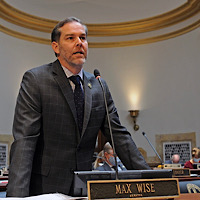Severe winter weather forced the Kentucky General Assembly to pause Regular Session activity during the week of February 15. My colleagues and I returned to Frankfort on Monday to resume legislative work on your behalf.
I hope that you and your family remained safe during the period of heavy ice and snowstorms. We really cannot say enough about the men and women who work to keep the roads clear and the lights on. Stories across the Commonwealth included county personnel helping other counties, emergency efforts to get necessities to people who were without, and so much more. During crises, the general good in people shows through, and the storm is braved together. Thank you to all involved in helping restore normalcy.
Upon legislators returning to Frankfort, the House and Senate got back to work on legislative business with robust committee meeting agendas and policy discussions on the floor, each passing several bills out of their respective chambers this week.
Bills that are deemed as "priority" seek to address the state's most immediate challenges or focus on areas of the law that are of importance to Kentuckians. Several priority measures relate to the COVID-19 pandemic and its impact on the Commonwealth. Some seek to apply practical solutions to unemployment insurance issues and the economy, while others promote stronger legislative oversight to improve government transparency, among other topics.
Several priority bills continued through the legislative process this week. They included Senate Bill's 4, 6, 7, and 10.
Senate Bill 4 is a bipartisan measure that would create procedures and requirements for the issuance of both search warrants and arrest warrants that authorize entry without notice, commonly known as no-knock warrants. They would be allowed for instances where someone was believed to be in immediate danger, such as kidnapping cases. The no-knock warrants would also be allowed when sought in connection to cases involving certain violent crimes, terrorism or weapons of mass destruction. SB 4 serves to make potentially dangerous circumstances safer for both law enforcement and the public while also strengthening the public trust in agencies.
Senate Bill 6 is a priority bill that I am proud to be sponsoring, as it enacts new safeguards to ensure ethical behavior within the executive branch, particularly regarding members of gubernatorial transition teams' actions and behaviors. Transition teams consist of folks who help a Governor-Elect transition from candidate to the official office. They will help select individuals who will serve in the various positions within the Governor-Elect's administration and help determine policy goals and the new administration's general framework.
If passed, SB 6 would require the existing Executive Branch Ethics Commission to set ethical conduct standards related to transition teams by developing a prototype of ethical conduct agreement for transition team members to sign. It would apply to all members of a transition team and address the role of registered or former lobbyists. Members would be required to disclose certain information, such as their current employer, boards they serve as a member of, and any non-state sources of funds they receive for their, or their spouses, services. Additionally, the bill would prohibit transition team members from accessing non-public information regarding matters that could personally benefit them or their spouse, clients, or business they may belong to.
Senate Bill 7 is a critical measure that relates to Unemployment Insurance Benefits. This bill is in response to the overpayment of benefits carried out by the executive branch early on in the pandemic.
The issue of Unemployment Insurance here in the Commonwealth is staggering. How the Division of Unemployment Insurance has handled claims and distribution has resulted in countless backlogs, unanswered phone calls, leaving thousands of frustrated and desperate Kentuckians without the means to provide for their families. People are hurting, and SB 7 is just a small step taken to help remedy that.
Senate Bill 10 also made passage in the Senate. I feel that this measure can lead to meaningful dialogue and create a conducive environment for considering solutions for challenges facing communities across the Commonwealth. If passed, SB 10 would establish a Commission on Race & Access to Opportunity within the legislative branch to conduct studies and research where disparities may exist across sectors of educational equity, healthcare, economic opportunity, criminal justice, and more. The Commission established would have the authority to hold monthly meetings, seek comment and testimony from various individuals and organizations, and provide research to recommend data-driven policy initiatives.
During this time of great divisiveness, I think it's essential we consider the benefit of sitting with others in honest, open conversation with the intent to listen. No, that will not always lead to an agreement on policy, but it will lead to better understanding and rapport. While we all come from unique backgrounds, Endeavors like SB 10 promote more exact pathways.
Other bills passing in the Senate included:
Senate Bill 51 takes a step towards making it easier for doctors to treat patients struggling with substance use disorders by prohibiting insurers from requiring critical evaluations known as utilization reviews (UR). A UR requirement for matters such as addiction treatment can be unnecessarily onerous. Prior authorization requirements can similarly prevent patients from receiving needed treatment when they are ready. Removing requirements on this front can allow us to save lives here in Kentucky.
Senate Bill 52 closes existing loopholes in state statutes that prevent the punishment of some law enforcement who commit sexual assault. It clarifies that a peace officer who sexually assaults a subject held in custody is guilty of applicable class D felony in which they engaged.
Senate Bill 55 prohibits copayments or cost-sharing from being paid by any medical assistance recipients. It prohibits deductibles, copayments, and coinsurance requirements for Medicaid telehealth services and copayments charged in the Kentucky Children's Health Insurance Program (KCHIP). SB 55 applies to Medicaid Services or any Managed Care Organization (MCO) contracted by the Cabinet for Health and Family Services.
Senate Bill 56 limits the number of MCO contracts to operate the Medicaid program to three. Currently, there are five. Limiting them to three will increase efficiencies within the Medicaid program and lower administrative costs for healthcare providers.
Senate Bill 65 nullifies administrative regulations that were found deficient during the 2020 legislative interim and prohibits their re-enactment for a designated period if identical to or substantially the same. One limitation the legislature found flawed last year would have provided SNAP benefits to parents of children who have chosen to be absent in the child's life.
Senate Bill 67 allows for alcohol purchase to go as long as it is associated with a takeaway or "to-go" food order. All existing laws and regulations on alcohol would apply to alcohol sales, such as recognition of "dry territory" laws and license requirements.
Senate Bill 93 provides authority to appoint board members to the State Board of Agriculture to the Kentucky Commissioner of Agriculture.
Senate Bill 115 seeks to build on the Read to Achieve (RTA) program’s tremendous success by increasing access to its successful model to more students.
Senate Bill 148 declares the need for childcare in our communities as essential by requiring CHFS to identify emergency care providers who provide vital child care services during a state of emergency. It addresses a problem many families have struggled with throughout the last year concerning available childcare. The bill would return childcare classroom sizes to pre-COVID-19 numbers and allow them to combine classes during the opening and closing hours once again.
Bills making it to the governor last week for his consideration included SB 3 and HB 6. SB 3 moves the current Governor's Office for Agriculture Policy, also known as GOAP, under the Kentucky Commissioner of Agriculture's jurisdiction. HB 6 changes the Program Review Committee's name to "Legislative Oversight and Investigations Committee" and amends the Committee's duties to lean more towards investigations and corruption, misconduct, etc., misfeasance in state government.
As you can see, the General Assembly is not taking any time for granted. We are now past the halfway point of the 2021 Regular Session, with much work left to do. I will continue to provide weekly legislative updates in the weeks ahead. God Bless.
If you have any questions or comments about these issues or any other public policy issue, please call me toll-free at 1-800-372-7181 or email me Max.Wise@LRC.ky.gov or you can review the Legislature’s work online at www.legislature.ky.gov.
# # #
Note: Senator Max Wise (R-Campbellsville) represents the 16th District which encompasses Adair, Clinton, Cumberland, McCreary, Russell, Taylor, and Wayne Counties. He is Chairman of the Senate Standing Committee on Education; as well as co-chairman of the Education Assessment and Accountability Review Subcommittee. Senator Wise also serves as a member of the Senate Standing Committees on Health and Welfare; Agriculture; and Transportation. Additionally, Senator Wise serves as a member on the Budget Review Subcommittee on Education. For a high-resolution .jpeg of Senator Wise, please visit:




.png)

